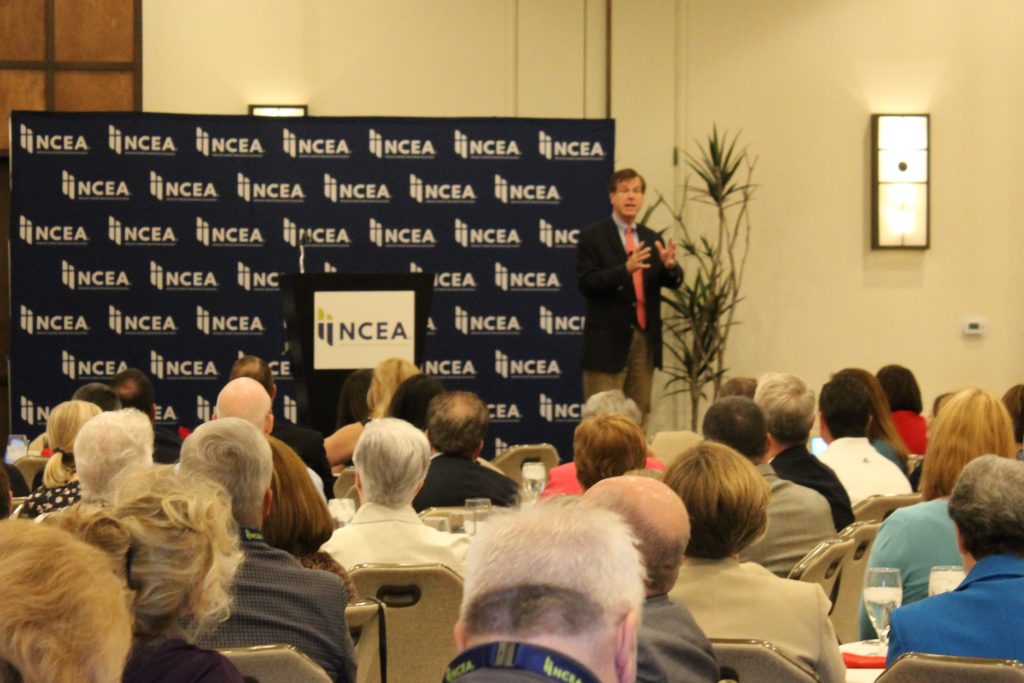NCEA was pleased to present Harry Kraemer, Jr. Professor of Management and Strategy Northwestern University’s Kellogg School of Management, as keynote speaker for the 2017 Catholic Leadership Academy for diocesan school leaders. This year’s event, hosted in the Diocese of Phoenix, welcomes over 350 leaders in Catholic education focused on the future of Catholic school education.
 As leaders, our actions and words always communicate something about the brand we serve. This keynote looked at ways Catholic school leaders can market Catholic schools through their leadership style, and how they can be effective witnesses to the value of Catholic schools. At the heart of the discussion was that, while marketing programs and campaigns are important, the message starts with the leader.
As leaders, our actions and words always communicate something about the brand we serve. This keynote looked at ways Catholic school leaders can market Catholic schools through their leadership style, and how they can be effective witnesses to the value of Catholic schools. At the heart of the discussion was that, while marketing programs and campaigns are important, the message starts with the leader.
Kraemer focused the first part of his presentation on characteristics of strong leaders. His first suggestion was to keep things simple. There are an amazing number of people who have a desire to say how complicated things are.
“In many dioceses you have a lot of well-intended people but they need to think global-level thinking. You have to get through the roots, into the trees and see the forest. The ability to keep things simple is huge.”
Next, Kraemer encouraged leaders to “use a lot of common sense.” The leader needs to step back – in a respectful way – to challenge thoughts. Ask questions such as “what does it have to do with our overall mission?” and “What does it have to do with growing Catholic schools?”
Kraemer then began to emphasize the importance of relating with people to help guide and influence people. He posed two questions to the leaders:
- Whatever your role, have you yet decided “I am one of those people to make a difference” or are you waiting for someone else to do it?
- Whatever you are doing, are you watching the movie or are you in the movie?
To help respond, he offers the following four principles for the journey to leadership:
- Self-reflection/Prayer “If you think about your career, your job, your calling, your family, your enjoyment… when you think about a lot do, often you default to ‘must go faster.’ Have we confused activity and productivity? Or are we moving so fast that we don’t realize how productive we really are? A values-based leader takes the time to reflect and pray. Shut off the noise, go off by yourself and ask questions such as ‘what are my values? What is my purpose? What am I called to do as a Catholic leader?’ You are not able to think about things when you are doing 10 other things. Taking time to pray and reflect, helps you put things in perspective and prioritize. Self-reflection is not self-absorption, it is not studying the cosmos. Leaders want to be challenge and we have to challenge ourselves.”
2. Balance. “A value-based leader takes the time to understand all sides to the story. There are more than two sides of the story. Value-based leaders seek to understand before they are understood. They don’t come up with the answer themselves but they recognize it when they hear it.”
3. “True” self-confidence. “It is not egotistical, arrogant, obnoxious or complacent. It’s saying ‘I am very well aware of the fact that God gave me certain strengths, there are other things I am not good it, but I’m okay. I know what I know, I know what I don’t know. I am a work in process.’ True self-confidence asks ‘have you reached a point yet in your life where you are comfortable enough to say ‘I don’t know.’? Are you willing to admit when you were wrong? People rarely relate to those who know everything and don’t make mistakes. If you can admit that you don’t know something you are relatable and can influence people.”
4. “Genuine” humility. “Whatever your role is and what your responsibility is – how did you get to where you are now? Genuine humility is the understanding that you got there beyond your experience and skill set but that it is a Gift from God combined with luck, timing, hardwork and a great team. You never forget where you came from, you keep things in perspective and the higher up you go, there better be a few people who knew you before you became the big shot. Genuine humility is made from the reminder and the realization that every single person matters.”
The presentation was punctuated by discussion from the audience and set the stage for the focus of the remainder of the CLS gathering that introduced market research data exploring perceptions of Catholic education from parents today and identifying the greatest opportunities to improving and promoting Catholic schools.
More information about Harry Kraemer and his work, please visit www.harrykraemer.org.